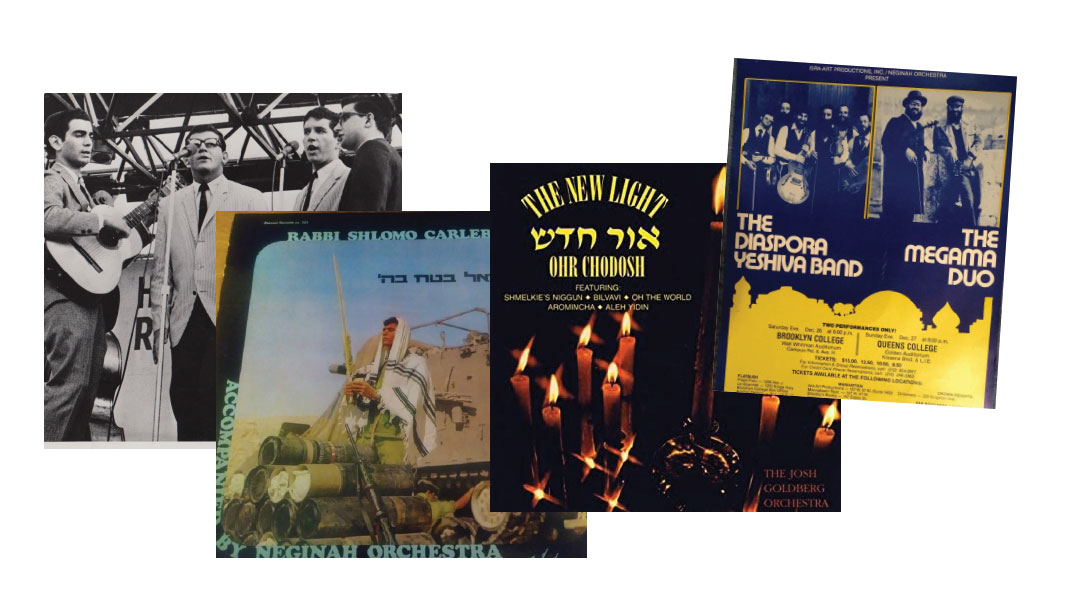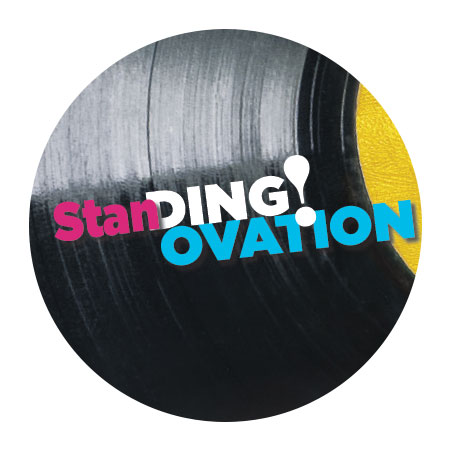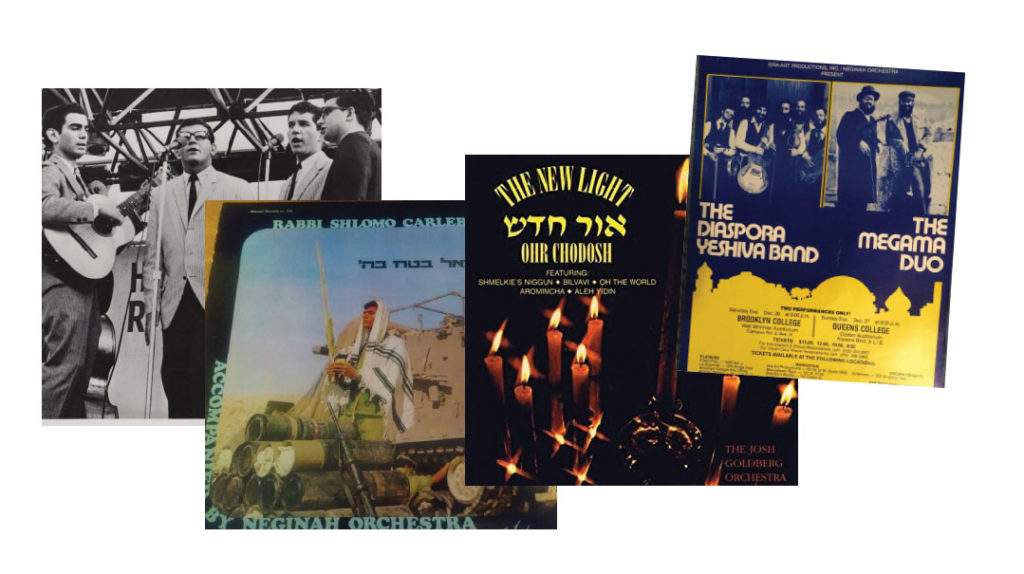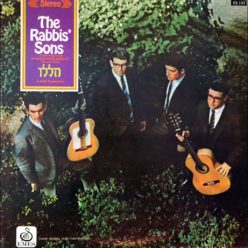Often it was the exposure from that first public concert that put future stars on the map

I

THE RABBIS’ SONS, whose first album Halelu came out in June 1967, just after the Six Day War, got their lucky break a month later when the Salute to Israel-Rheingold Music Festival invited them to sing in Central Park. The concert brought thousands upon thousands of all types of Jews together, and the group made history with many of their enduring classics, such as “Mi Ha’ish” and “Rabos Machshavos.” The record was actually slated to be called The Yeshivah Album, and the money was going to go to the Chofetz Chaim yeshivah, where Baruch Chait, the composer of the songs, was studying. Reb Burry played the album for the Rosh Yeshivah, but the Rosh Yeshivah was a little nervous that the songs were a bit too hip, so they changed the name to The Rabbis’ Sons. Label Scharfman, Baruch Chait, and Itzy Weinberger were all sons of prominent rabbis, and Reb Burry always jokes that even though Michael Zeitlin’s father wasn’t a rabbi, he gave him a musical semichah….
Young readers might not be familiar with OHR CHODOSH, but in 1971, Yossi Toiv (aka Country Yossi), along with Rabbi Shmuel Brazil, released their first Ohr Chodosh album entitled The New Light. Trust me when I say that practically every Jewish home owned that record, which featured such classics as “Shmelkie’s Niggun,” “Eileh Barechev,” and “Bilvavi.” And Yossi was only 16 when he composed the hit song, “Aleh Yidden.” Their first live performance was in the summer of 1972 in the Pioneer Hotel, which was famous for showcasing many Jewish performers. And who else was part of the Ohr Chodosh group? There was Nachum Deutsch and Yossi Leiber, and The Messengers were the backup band, conducted by Heshy Walfish on keyboard and Yehudah Isaacs on drums.
What most people don’t know is that before MORDECHAI BEN DAVID came out with his mega hit album Hineni in 1974, he’d actually recorded an album the previous year, called Mordechai Ben David Original Chassidic Niggunim. It’s a bit of an unknown album, but there are actually some great songs on it (including his first famous “Yosis”). Mordechai’s first concert took place in the early ‘70s, in Brooklyn College, and believe it or not, he was the opening act for Ohr Chodosh. They broke up soon afterward, but MBD is still going strong. And can you guess what his paycheck for that night’s performance was? I hope you’re sitting: $50.
SHLOMO CARLEBACH’s first major concert was in NYC’s Town Hall in 1962. A few years ago, I was talking to his sister, Mrs. Shulamit Levovitz a”h (who was married to Rav Yerucham Levovitz’s son Rav Simcha Zissel), and she showed me the ticket that she still had from that performance — a front-row seat. And the price? Two dollars and fifty cents — a real deal. Shlomo’s concerts were super interesting because, not only did the audience not know what was coming next, neither did he — he never had a song list, or a prepared repertoire. He just sang what came to his mind. There was one exception, though. Soon after the Yom Kippur war, concert producers Moshe Kahn a”h and Isaac Gross contacted Shlomo, and asked him to do a live concert in Brooklyn College, featuring all new songs. People thought that Shlomo would never be able to pull it off, but with the help of Yisroel Lamm, the show was flawless. Every song was a hit, especially his classic “Hashem Oz,” in which he told the story of a father, who had lost one son in the Six Day War, being told that his second son had been killed in the Yom Kippur War, and how the heartbroken father reacted upon hearing the news. (He took a little wine and said “L’chayim my holy son, I envy you, you gave your life for the Holy Land, Hashem oz le’amo yitein…”) The concert was turned into a live album, called Yisrael Betach B’Hashem, with the famous cover featuring a picture of an Israeli soldier standing on a tank in the desert, holding a lulav and esrog aloft, draped in his tallis. Back then, it was a symbol for all of Klal Yisrael.
I asked ABIE ROTENBERG to tell me about the first concert he ever did — and it wasn’t with Dveykus, or Journeys, and he didn’t even sing. Shlomo Carelbach was doing a concert in Queens college, near where Abie lived, and two days before the concert, Shlomo broke his leg. He wasn’t able to stand or play guitar. As a last minute resort, Abie was contacted and actually played guitar for an injured Shlomo. I guess you could say Abie was in “The Place Where He Belonged.”
Avraham Rosenblum, along with Simcha Abramson, Ruby Harris, Gedalya Goldstein, Ben Zion Solomon, Menachen Herman and others, met in Jerusalem’s Diaspora Yeshiva in 1975, but didn’t go on tour until 1979 — that was one long rehearsal. They’d been playing together every Motzaei Shabbos at King David’s Tomb, but things changed when the DIASPORA YESHIVA BAND toured the United States, covering a whopping 26 cities — a long time to wander the Diaspora. Their first stop was Brooklyn College, where they shared the night with Safam, an American Jewish pop band from Boston. Two years later, they redid that same tour, this time with the Megama Duo’s Moshe Yess a”h and Shalom Levine a”h.
As concerts continued into the 1980s, they became more family oriented, with popular performers including Toronto and Miami Boys Choirs, Yoel Sharabi, Uncle Moishy, and Amudei Shaish, to name a few of the decade’s concert staples. And then came the night of January 17, 1988. What happened that night, that changed the course of Jewish concerts forever? I’ll save that for next time….
(Originally featured in Mishpacha, Issue 816)




